On 25 October 2016, Romanian-born actress Margit Bara passed away at the age of 88. The beautiful star of the Hungarian theatre also appeared in 25 films between 1956 and 1975. In Hungary, she became a legend and is respected as one of the most talented Hungarian actresses of all time.
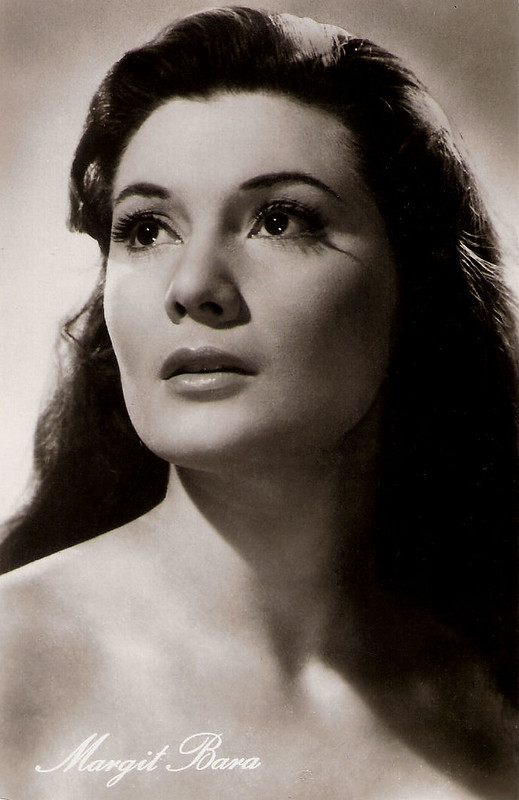
East-German postcard by VEB Progress Filmvertrieb, Berlin, no. 578, 1957. Photo: Magyar-Film. Publicity still for Szakadék/Abyss (László Ranódy, 1956).
Margit Bara was born Margit Éva Bara in Cluj, Romania in 1928. In 1945, she started to play as an extra at the Theatre of Cluj. She played there for ten years, and in the meanwhile she studied for a year at the Academy of Dramatic Arts.
In Cluj, Bara met her first husband, actor Géza Halász, with whom she moved to Hungary in 1955. One of her first films was the Hungarian film Szakadék (László Ranódy, 1956) with Ferenc Bessenyei.
She then starred in the romantic drama Bakaruhában/In Soldier's Uniform (Imre Fehér, 1957). With this film the 1957 Karlovy Vary Film Festival was launched. Set during WW1, the story revolves around a Hungarian journalist (Ivan Darvas) who is required by law to wear his military uniform twice a week. Our hero falls in love with a similarly-uniformed young woman, never dreaming that she is a servant girl (Margit Bara) and, as such, ‘beneath his station.’
Other films in which she played the lead were Csempészek/Smuggler (Félix Máriássy, 1958), and A tettes ismeretlen/Danse macabre (László Ranódy, László Nádasy, 1958) with Andor Ajtay.
She had a supporting part in Ház a sziklák alatt/The House Under the Rocks (Károly Makk, György Hintsch, 1959). This film drama was one of the hits of the 1958 Venice Film Festival, and was equally well received at the San Francisco Film Festival. The film is considered by many to be director Karoly Makk's masterpiece.
Janos Gorbe plays a soldier, sick of heart and mind, who returns to his home after a long and debilitating war. He finds that his wife is dead, and his son is now under the care of his sister-in-law, played by Irene Psota. An embittered hunchback, Psota tends to Gorbe's wounds and keeps him isolated from the rest of the village, hoping in this way that he will eventually fall in love with her. He doesn't, and tragedy is the result.
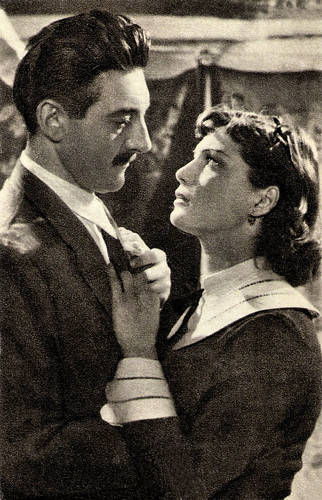
Hungarian postcard by SZ, Budapest, no. 331 / 17 / 564. Retail price: 60 Fillér. Photo: Kovács. Publicity still for Szakadék/Abyss (László Ranódy, 1956) with Imre Sinkovits.
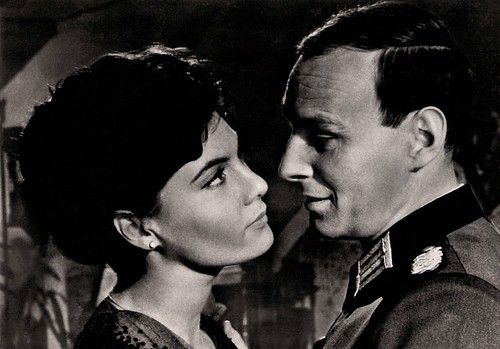
East-German postcard by VEB Progress Filmvertrieb, Berlin, no. 1834, 1963. Retail price: 0,20 DM. Photo: publicity still for Polnocná omsa/Midnight Mass (Jiri Krejcik, 1962) with Hannjo Hasse.
During the early 1960s, Margit Bara appeared in such Hungarian films as Katonazene (Endre Marton, György Hintsch, 1961).
She had her international breakthrough with the Hungarian drama film Pacsirta/Drama of the Lark (László Ranódy, 1963), based a novel by Dezső Kosztolányi. It was entered into the 1964 Cannes Film Festival where the lead, Antal Páger won the award for Best Actor.
Bara played the lead opposite Miklos Gábor in the Hungarian film drama Kertes házak utcája/A Cozy Cottage (Tamás Fejér, 1963) which was entered into the 1963 Cannes Film Festival.
In 1966 she appeared in Hideg Napok/Cold Days (Andras Kovacs, 1966). Director Kovacs was a leading light of the new Hungarian cinema.
According to Hal Erickson at AllMovie, Kovacs brought his “'docudrama' technique to this story which deals with the systematic slaughter of Jews and Serbians by Hungarian fascists during World War II. Kovacs is not quite a revisionist historian, but he does cast doubt on the 'official' interpretations of this horrible human-rights violation. Nor is the audience allowed to slip into complacency: it comes as a shock to discover that many of the characters whom we're rooting for turn out to be the villains!”
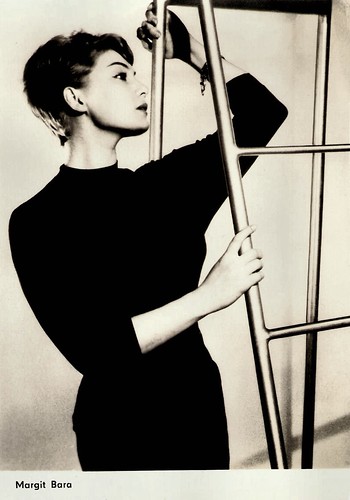
East-German postcard by VEB Progress Filmvertrieb, Berlin, no. 1632, 1961.
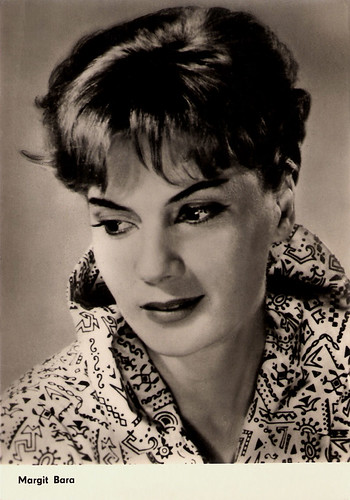
East-German postcard by VEB Progress Filmvertrieb, Berlin, no. 1686, 1962. Photo: Hungarofilm.
One of Margit Bara’s final films, Jakob der Lügner/Jacob the Liar (Frank Beyer, 1975), is also one of her most famous works. This East German-Czechoslovakian Holocaust film was based on the novel of the same name by Jurek Becker.
Work on the picture began in 1965, but production was halted in the summer of 1966. Becker, who had originally planned Jacob the Liar as a screenplay, decided to make it a novel instead. In 1972, after the book garnered considerable success, work on the picture resumed.
In a Jewish ghetto in German-occupied Poland, a man named Jakob (Vlastimil Brodský) is summoned to the Gestapo office on a charge he broke the curfew. As the soldier who sent him there merely played a prank on him, he is released, but not before hearing a radio broadcast about the defeats of the German Army. As no one believes he went to the Gestapo and came out alive, Jakob makes up another tale, claiming he owns a radio – a crime punishable by death. He then starts encouraging his friends with false reports about the advance of the Red Army toward their ghetto. The residents, who are desperate and starved, find new hope in Jakob's stories. But it all ends as the Germans deport the people to their death in the extermination camps.
Jacob the Liar was the first ever East German film that was entered into the Berlin International Film Festival in West Berlin: in the XXV Berlinale, Vlastimil Brodský won the Silver Bear for Best Actor. It was also nominated for the Academy Award for Best Foreign Language Film at the 49th Academy Awards, the only East German picture ever to be selected.
In 1977, there was a malicious rumour campaign against Margit Bara, and she decided to retire. In 1992, she received the Order of Merit of the Republic of Hungary and in 2010 she was honoured with the Kossuth Prize, a Lifetime Achievement Award.
Margit Bara passed away in Budapest, Hungaru, on 25 October 2016. She was married twice. First to actor Géza Halász and later to Dezső Gyarmati. With Gyarmati, who died in 2013, she had one child.
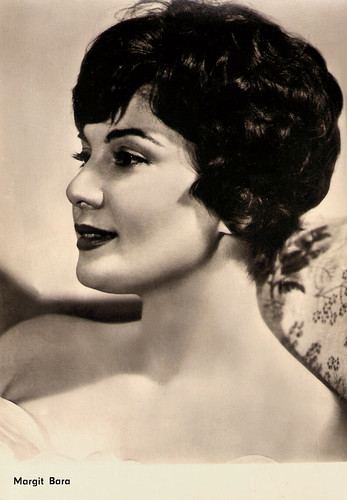
East-German postcard by VEB Progress Filmvertrieb, Berlin, no. 1687, 1962. Retail price: 0,20 DM. Photo: Hungarofilm.
Sources: Hal Erickson (AllMovie) Wikipedia (English and Hungarian) and IMDb.

East-German postcard by VEB Progress Filmvertrieb, Berlin, no. 578, 1957. Photo: Magyar-Film. Publicity still for Szakadék/Abyss (László Ranódy, 1956).
Karoly Makk's masterpiece
Margit Bara was born Margit Éva Bara in Cluj, Romania in 1928. In 1945, she started to play as an extra at the Theatre of Cluj. She played there for ten years, and in the meanwhile she studied for a year at the Academy of Dramatic Arts.
In Cluj, Bara met her first husband, actor Géza Halász, with whom she moved to Hungary in 1955. One of her first films was the Hungarian film Szakadék (László Ranódy, 1956) with Ferenc Bessenyei.
She then starred in the romantic drama Bakaruhában/In Soldier's Uniform (Imre Fehér, 1957). With this film the 1957 Karlovy Vary Film Festival was launched. Set during WW1, the story revolves around a Hungarian journalist (Ivan Darvas) who is required by law to wear his military uniform twice a week. Our hero falls in love with a similarly-uniformed young woman, never dreaming that she is a servant girl (Margit Bara) and, as such, ‘beneath his station.’
Other films in which she played the lead were Csempészek/Smuggler (Félix Máriássy, 1958), and A tettes ismeretlen/Danse macabre (László Ranódy, László Nádasy, 1958) with Andor Ajtay.
She had a supporting part in Ház a sziklák alatt/The House Under the Rocks (Károly Makk, György Hintsch, 1959). This film drama was one of the hits of the 1958 Venice Film Festival, and was equally well received at the San Francisco Film Festival. The film is considered by many to be director Karoly Makk's masterpiece.
Janos Gorbe plays a soldier, sick of heart and mind, who returns to his home after a long and debilitating war. He finds that his wife is dead, and his son is now under the care of his sister-in-law, played by Irene Psota. An embittered hunchback, Psota tends to Gorbe's wounds and keeps him isolated from the rest of the village, hoping in this way that he will eventually fall in love with her. He doesn't, and tragedy is the result.

Hungarian postcard by SZ, Budapest, no. 331 / 17 / 564. Retail price: 60 Fillér. Photo: Kovács. Publicity still for Szakadék/Abyss (László Ranódy, 1956) with Imre Sinkovits.

East-German postcard by VEB Progress Filmvertrieb, Berlin, no. 1834, 1963. Retail price: 0,20 DM. Photo: publicity still for Polnocná omsa/Midnight Mass (Jiri Krejcik, 1962) with Hannjo Hasse.
Docudrama Technique
During the early 1960s, Margit Bara appeared in such Hungarian films as Katonazene (Endre Marton, György Hintsch, 1961).
She had her international breakthrough with the Hungarian drama film Pacsirta/Drama of the Lark (László Ranódy, 1963), based a novel by Dezső Kosztolányi. It was entered into the 1964 Cannes Film Festival where the lead, Antal Páger won the award for Best Actor.
Bara played the lead opposite Miklos Gábor in the Hungarian film drama Kertes házak utcája/A Cozy Cottage (Tamás Fejér, 1963) which was entered into the 1963 Cannes Film Festival.
In 1966 she appeared in Hideg Napok/Cold Days (Andras Kovacs, 1966). Director Kovacs was a leading light of the new Hungarian cinema.
According to Hal Erickson at AllMovie, Kovacs brought his “'docudrama' technique to this story which deals with the systematic slaughter of Jews and Serbians by Hungarian fascists during World War II. Kovacs is not quite a revisionist historian, but he does cast doubt on the 'official' interpretations of this horrible human-rights violation. Nor is the audience allowed to slip into complacency: it comes as a shock to discover that many of the characters whom we're rooting for turn out to be the villains!”

East-German postcard by VEB Progress Filmvertrieb, Berlin, no. 1632, 1961.

East-German postcard by VEB Progress Filmvertrieb, Berlin, no. 1686, 1962. Photo: Hungarofilm.
Jacob the Liar
One of Margit Bara’s final films, Jakob der Lügner/Jacob the Liar (Frank Beyer, 1975), is also one of her most famous works. This East German-Czechoslovakian Holocaust film was based on the novel of the same name by Jurek Becker.
Work on the picture began in 1965, but production was halted in the summer of 1966. Becker, who had originally planned Jacob the Liar as a screenplay, decided to make it a novel instead. In 1972, after the book garnered considerable success, work on the picture resumed.
In a Jewish ghetto in German-occupied Poland, a man named Jakob (Vlastimil Brodský) is summoned to the Gestapo office on a charge he broke the curfew. As the soldier who sent him there merely played a prank on him, he is released, but not before hearing a radio broadcast about the defeats of the German Army. As no one believes he went to the Gestapo and came out alive, Jakob makes up another tale, claiming he owns a radio – a crime punishable by death. He then starts encouraging his friends with false reports about the advance of the Red Army toward their ghetto. The residents, who are desperate and starved, find new hope in Jakob's stories. But it all ends as the Germans deport the people to their death in the extermination camps.
Jacob the Liar was the first ever East German film that was entered into the Berlin International Film Festival in West Berlin: in the XXV Berlinale, Vlastimil Brodský won the Silver Bear for Best Actor. It was also nominated for the Academy Award for Best Foreign Language Film at the 49th Academy Awards, the only East German picture ever to be selected.
In 1977, there was a malicious rumour campaign against Margit Bara, and she decided to retire. In 1992, she received the Order of Merit of the Republic of Hungary and in 2010 she was honoured with the Kossuth Prize, a Lifetime Achievement Award.
Margit Bara passed away in Budapest, Hungaru, on 25 October 2016. She was married twice. First to actor Géza Halász and later to Dezső Gyarmati. With Gyarmati, who died in 2013, she had one child.

East-German postcard by VEB Progress Filmvertrieb, Berlin, no. 1687, 1962. Retail price: 0,20 DM. Photo: Hungarofilm.
Sources: Hal Erickson (AllMovie) Wikipedia (English and Hungarian) and IMDb.
No comments:
Post a Comment